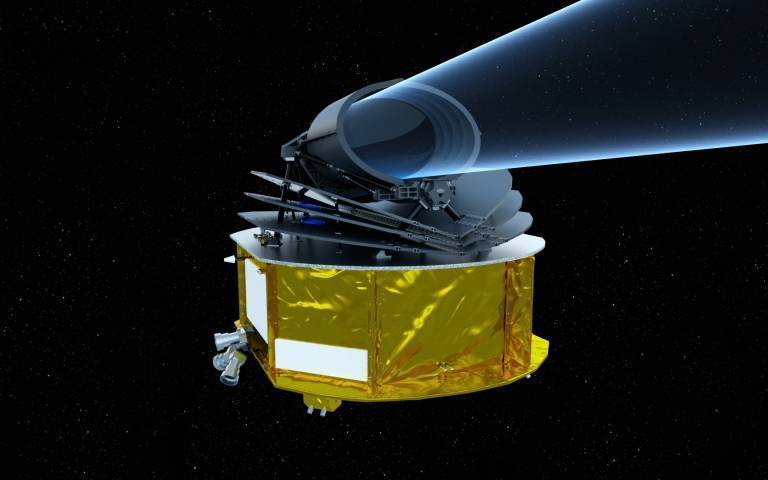Exoplanet mission, led by Head of Astrophysics - Prof Tinetti, receives £30 million UK investment
21 June 2022
The European Space Agency’s exoplanet mission Ariel, whose scientific leadership is provided by UCL, is to receive a £30 million investment from the UK.

The funding from the UK Space Agency is part of a new agreement signed by ESA member states to confirm roles for the mission. The UK signature was provided by UK Space Agency’s Head of Space Science, Dr Caroline Harper.
It is the first space mission dedicated to this analysis and will provide a step-change in our understanding of what exoplanets are made of, how they were formed and how they evolve. Scientific data will be released to the scientific community and general public at regular intervals throughout its planned four-year operational phase.
Professor Giovanna Tinetti (Head of Group), principal investigator for the mission, said: “Ariel will be transformational in helping us understand the planets in our galaxy. By studying hundreds of diverse worlds in different environments, we will see our own planet in context, giving us a better sense of why Earth formed as it did.
“We are very grateful to the UK Space Agency and the UK government for their continued support and commitment in advancing planetary science, helping us understand worlds beyond our solar system as well as within it.”
Ariel (Atmospheric Remote-sensing Infrared Exoplanet Large-survey) was proposed by an international consortium led by UCL’s Professor Tinetti and was selected by ESA from 26 proposals put forward to be the next medium class mission in its science programme. The UK will lead the overall science of the mission, and head up a consortium of 17 countries building the mission’s payload module.
Science Minister George Freeman said: “This is an incredibly important moment for the UK space sector, marking a major milestone for the National Space Strategy and boosting our ambitions to grow the UK sector into a leading world player.
“By investing £30.3 million and taking the helm of the entire Ariel consortium – the first time in a decade that that the UK has secured leadership for a mission of this magnitude – will put the UK at the heart of international space research.
“This commitment will help to build the profile of our science and technology experts, providing opportunities for businesses and academics across the sector, and for the UK economy as a whole.”
The £30 million is in addition to more than £6 million the UK Space Agency has already provided to support UK teams during Ariel’s study phase up to March 2022.
As well as UCL, UK organisations contributing expertise to the mission include Cardiff University, University of Oxford and the Science and Technology Facilities Council’s RAL Space.
Teams at RAL Space will build and test the Ariel payload module, managing hardware contributions from other consortium nations, as well as the development of a £5.5 million cryogenic active cooler system.
Scientists at UCL and University of Cardiff will lead performance analysis, testing and fine-tuning the complex algorithms that will process the data returned from Ariel. The University of Oxford team will deliver the equipment to test Ariel’s payload telescope and optical elements.
A payload design review will be completed later this year, with the design expected to be finalised by 2025. A flight acceptance review will be completed in early 2029 ahead of launch later that year.
UK government announcement can be found here.
Many congratulations to Prof. Giovanna Tinetti, Prof. Giorgio Savini, Dr Ingo Waldmann, Prof. Sergey Yurchenko, Prof. Jonathan Tennyson, Dr Ahmed Al-Refaie, Dr Mihkel Kama, Dr Gordon Kai Yip, Dr Quentin Changeat, Ms Emma Dunford, Ms Vinooja Thurairethinam, Dr Angelos Tsiaras and Dr Billy Edwards, all members of the Astrophysics community at UCL.
 Close
Close

